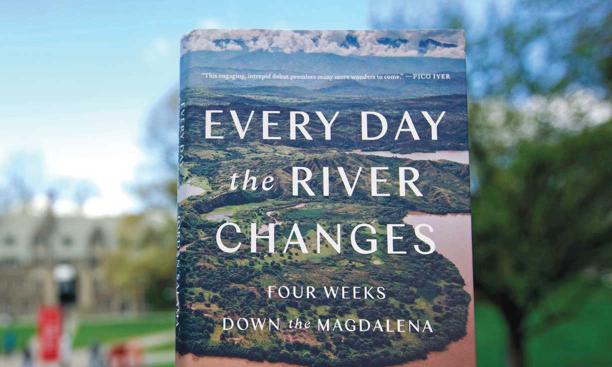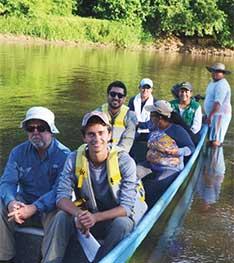
When I took office in 2013, I created the Princeton Pre-read. Each year, I select a book to introduce incoming undergraduates to the academic life of the University. We send copies to all of our new students and to many others on campus, and the author meets with our incoming class during orientation week.
I think of the Pre-read as an academic counterpart to the Pre-rade, the joy-filled parade that takes the entering class through FitzRandolph Gate after Opening Exercises.
In previous years, I have typically chosen Pre-reads written by faculty members or scholars whose work might appear on Princeton syllabi. This year, I took a different approach. I selected a book that exemplifies outstanding student work. The book is Every Day the River Changes: Four Weeks Down the Magdalena.
Its author, Jordan Salama, is a member of Princeton’s Great Class of 2019, and the book grew out of his Princeton senior thesis. He becomes the first Pre-read author to have participated in the Pre-read as a student.
Jordan’s book is a fresh approach to the old genre of travel writing. It describes his experiences on and around Colombia’s Magdalena River, a trip that took him through areas recovering from a prolonged period of political violence and rarely visited by students or tourists.
The book invites us, as Jordan says, to join him in not only “a journey down a river” but also “an immersion into the lives of the ordinary people who find themselves alongside it.”(1)I like Every Day the River Changes for many reasons. Prominent among them is the deep empathy that informs Jordan’s treatment of the people he meets and the country through which he travels.
Jordan could have told a different, more judgmental or disputatious story about Colombia and the Magdalena. Indeed, other storylines—about, for example, political strife, colonialism, crime, and inequality—emerge occasionally in his book but remain subordinate to more intimate and personal vignettes.
Jordan’s humane and respectful perspective is rare, and greatly needed, in today’s world, where public discourse too often bristles with anger, cynicism, or rage.
I also like Jordan’s book because it will introduce entering students not only to the individuals, communities, and cultures that he encountered on his travels, but also to the kinds of opportunities that await them at Princeton. As Jordan reports his observations about Colombia, he describes how his book benefited from summer internships, coursework, extracurricular reading, and the encouragement that he received from mentors and friends.
With the world reopening in the wake of the pandemic, I want our incoming students to think imaginatively and creatively about what they might do, on our campus and far beyond it, during their Princeton careers. As Jordan’s book illustrates, the possibilities are almost limitless.
For example, Jordan mentions in passing a summer experience in South America where he traced the route his great-grandfather followed through rural communities in Argentina and southern Bolivia.(2) Funding for that trip came from the Martin A. Dale ’53 Summer Awards, a program designed with quirky, original, and imaginative projects in mind. The Dale Awards support exploratory adventures not connected to any coursework or other academic requirements.
Students have used Dale Awards to, for example, explore hip-hop culture in Shanghai, follow the routes of ancient Christian pilgrims, and delve into the connections between food and identity by visiting local restaurants in American towns and cities.
I am not sure that any students come to Princeton with a Dale Award project in mind, but I am confident that many of those who receive these awards find the experience transformative.
Finally, I like Jordan’s book because his voyage of discovery can serve as an apt metaphor for the journey that our incoming students will soon begin at Princeton. I expect most alumni will agree with me, as they look back on their own path through Old Nassau, that new arrivals will at times find this campus no less mysterious, foreign, surprising, or magical than the Magdalena river basin.
Like the Magdalena, Princeton, too, changes every day—and, I might add, it changes with every student. All of us who attended this place have our own set of stories to tell about it, and I have no doubt that will be true for those about to arrive in 2022.
I look forward to discussing Every Day the River Changes with our incoming students as they begin to explore this marvelous University and all that it has to offer. I look forward to discussing it with alumni, too. I have been very pleased that, over the past decade, the alumni community has taken an interest in the Pre-read, and I anticipate that Jordan’s story will inspire his fellow Tigers to reflect on the journeys, discoveries, and experiences that have shaped their own lives.
1 Every Day the River Changes 18
2 Id. at 14.

